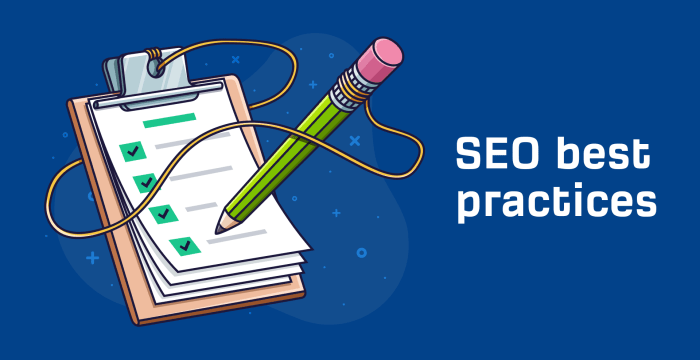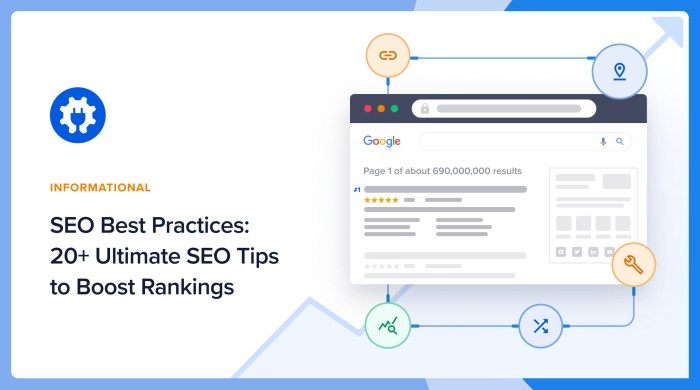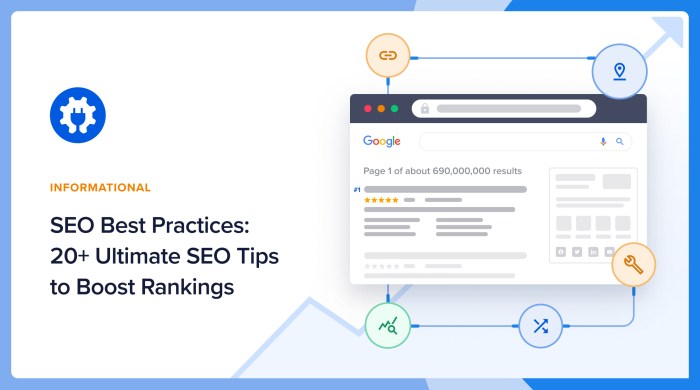SEO Best Practices – Best Practices take the spotlight, inviting you into a world where website ranking reigns supreme. Get ready to dive into the realm of with expert tips and tricks that will elevate your online presence to new heights.
Let’s explore the ins and outs of optimization, from on-page strategies to off-page tactics and technical tweaks that will set your website apart from the rest.
Importance of Best Practices

Yo, listen up! best practices are like the secret sauce for your website ranking, man. It’s crucial to follow these guidelines if you wanna be seen and heard in the digital jungle.
When you rock proper , your website gets a VIP pass to the top of search engine results pages. That means more eyeballs on your content, more clicks, and more chances to shine like a diamond in the rough.
Positive Impact of Proper
- Boost in organic traffic: With killer , your website can attract more visitors without spending big bucks on ads.
- Improved user experience: best practices help you create a smooth, user-friendly website that keeps visitors coming back for more.
- Higher conversion rates: When your website ranks high and looks fly, it’s easier to turn visitors into loyal customers. Cha-ching!
Consequences of Ignoring Best Practices
- Low visibility: Without proper , your website might end up lost in the vast digital wilderness, never to be found by potential visitors.
- Lack of credibility: If your website doesn’t rank well, peeps might think you’re not legit or up-to-date with the times. Ouch!
- Missed opportunities: Ignoring best practices means you’re leaving money on the table and letting your competitors steal the spotlight. Not cool, dude.
On-Page Best Practices: SEO Best Practices

When it comes to optimizing your website for search engines, on-page plays a crucial role in improving your search engine visibility. By focusing on on-page optimization, you can enhance the relevance and quality of your content, making it easier for search engines to understand and rank your website.
Optimizing Meta Tags
Meta tags are essential elements of your website’s HTML that provide information about the content of your page to search engines. Optimizing meta tags can help improve your website’s visibility in search engine results. Here are some tips for optimizing meta tags:
- Include relevant s: Make sure to include relevant s in your meta title and description to help search engines understand the topic of your page.
- Keep it concise: Meta titles should be around 50-60 characters, while meta descriptions should be around 150-160 characters to ensure they are displayed correctly in search results.
- Avoid duplicate content: Each page on your website should have unique meta tags to avoid confusion for search engines.
Creating High-Quality Content
Creating high-quality content is essential for improving your on-page . Here are some tips to help you create content that is optimized for search engines:
- Focus on relevance: Make sure your content is relevant to your target audience and includes relevant s that users are likely to search for.
- Optimize headings: Use headings (H1, H2, H3, etc.) to structure your content and make it easier for search engines to understand the hierarchy of information on your page.
- Include multimedia: Incorporate images, videos, and other multimedia elements to make your content more engaging and shareable.
Off-Page Best Practices
When it comes to off-page , one of the key factors that can significantly impact your website’s ranking is backlink building. Backlinks are links from other websites that point to your site, signaling to search engines that your content is valuable and trustworthy.
Importance of Backlink Building
Building a strong backlink profile is crucial for improving your site’s authority and credibility in the eyes of search engines. Quality backlinks from reputable websites can help boost your organic search rankings and drive more traffic to your site.
- Guest Blogging: Writing high-quality guest posts for relevant websites in your industry can help you earn valuable backlinks.
- Broken Link Building: Finding broken links on other websites and offering your content as a replacement is a great way to acquire backlinks.
- Resource Link Building: Creating valuable resources, such as guides or infographics, can attract natural backlinks from other sites.
Social media plays a crucial role in off-page by allowing you to promote your content and engage with your audience, increasing the chances of earning quality backlinks.
Social Media in Off-Page
Utilizing social media platforms like Facebook, Twitter, and LinkedIn can help you amplify your content reach and attract more visitors to your site. By sharing your content on social media, you can encourage others to link back to your website, further boosting your off-page efforts.
- Engage with Your Audience: Respond to comments, messages, and mentions to build relationships and encourage sharing.
- Share Valuable Content: Post informative and engaging content that resonates with your target audience to increase shares and backlinks.
- Participate in Communities: Join relevant online communities or groups to share your content and connect with potential backlink sources.
Technical Best Practices
When it comes to optimizing your website for search engines, technical plays a crucial role in ensuring your site is easily accessible and crawlable by search engine bots. Technical involves various optimizations to improve the backend structure of your website, ultimately enhancing its visibility and ranking on search engine results pages.
Optimizing Website Speed, SEO Best Practices
In the world of , website speed is a critical factor that can significantly impact your site’s performance in search results. Slow-loading websites not only frustrate users but also deter search engines from ranking your site higher. To optimize your website speed for better performance, consider the following best practices:
- Minimize server response time by using a reliable hosting provider and optimizing server configurations.
- Enable browser caching to store frequently accessed resources locally on users’ devices.
- Optimize images and videos by reducing their file sizes without compromising quality.
- Implement lazy loading to defer the loading of non-essential resources until they are needed.
- Utilize Content Delivery Networks (CDNs) to distribute content across multiple servers for faster delivery to users worldwide.
Mobile Optimization
With the increasing use of mobile devices for browsing the internet, optimizing your website for mobile is no longer optional but a necessity. Mobile optimization involves making your site responsive and user-friendly on various mobile devices, ensuring a seamless browsing experience for users. To achieve optimal mobile optimization, consider the following best practices:
- Implement responsive web design to ensure your site adapts to different screen sizes and resolutions.
- Avoid the use of Flash and pop-ups that can hinder mobile user experience.
- Optimize your site’s loading speed for mobile users by minimizing JavaScript and CSS files.
- Ensure that all content, including images and videos, is easily viewable on mobile devices without the need for horizontal scrolling.
- Utilize Google’s Mobile-Friendly Test tool to identify and fix any mobile usability issues on your site.






